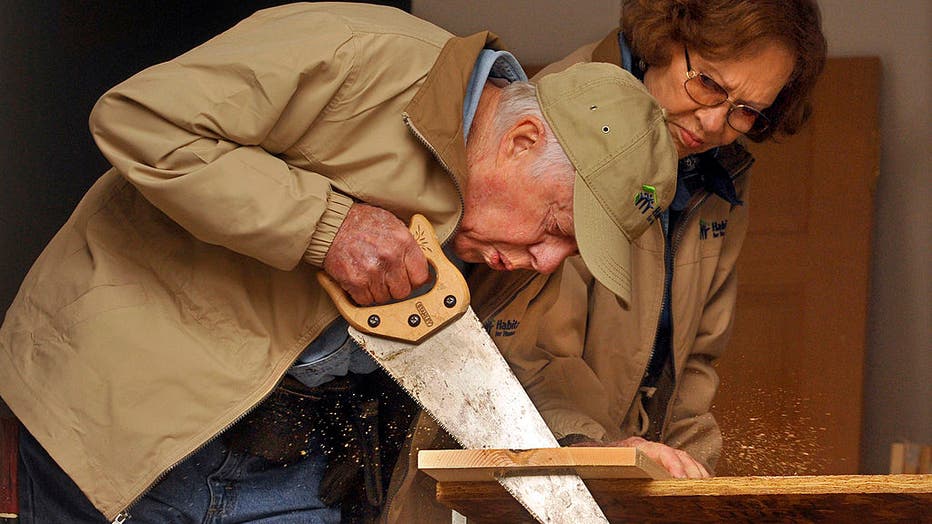Jimmy Carter turns 100: Star-studded concert held, homes built in his honor
Nashville's Habitat for Humanity shares memories of Jimmy Carter
Habitat for Humanity has become synonymous with Jimmy Carter. The organization's CEO in Nashville, Tennessee joined LiveNOW from FOX's Josh Breslow to talk about the former president's legacy.
Former President Jimmy Carter turned 100 years old on Tuesday and a benefit concert was held as well as 30 homes were built in his honor.
The event algins with Carter's long legacy as a philanthropist.
The stat-studded concert was held last month at Atlanta’s Fox Theatre and raised $1.2 million so far to support the international programs of The Carter Center, which Jimmy and Rosalynn Carter founded in 1982 with the mission to " wage peace, fight disease, and build hope."
RELATED: Jimmy Carter 100: His most notable achievements, things you may not know
The concert airs on Georgia Public Broadcasting on Oct. 1.
On Monday, thousands of Habitat for Humanity volunteers gathered Monday to build 30 homes in St. Paul, Minnesota, over five days. Country singers Garth Brooks and Trisha Yearwood, who worked alongside the Carters for years, led the event. The couple also helped with projects in Hurricane Katrina's disaster area.
Carters and Habitat for Humanity
The Carters' relationship with Habitat for Humanity stretches back 40 years, to when the couple went to New York City on a build in 1984.
"The image of a president of the United States sleeping in a church basement and physically helping rehab a tenement building captured the world," said Jonathan Reckford, CEO of Habitat for Humanity International. The Carters went on to build homes annually for 35 years. Carter repeatedly said that working with the organization was a way he put his Christian faith into action, Reckford recalled.

About 300 volunteers, including former President Jimmy Carter and former First Lady Rosalynn Carter, worked on houses in Baltimore, Maryland and Annapolis on Tuesday, October 5, 2010, as part of a weeklong nationwide project with Habitat for Humanity
Cleora Taylor, a medical assistant, met the Carters in August 2018 when they helped build 41 new homes in South Bend and Mishawaka, Indiana.
RELATED: Jimmy Carter receives lifetime achievement award from literary foundation
Years later, Taylor recalled how the former president greeted her by name and knew about her children, including her daughter, who was 11 at the time and had autism.
"It means so much to me that he knew me," said Taylor, speaking from her living room in the home The Carters helped her build, on a street named Carter Court. "He’s just such a good, welcoming, humble guy. I’m just glad to be a part of a legacy that he’s leaving behind."
A look at the Carters' legacy
Presidential historian Cassandra Newby-Alexander, professor of Virginia Black history and culture at Norfolk State University, said the strength of Carter’s legacy is in his morality. Unlike many who claim to care about the disadvantaged, Carter has shown that they — and not power or money — are his main concern, Newby-Alexander said.
"I think he has probably done more personally in his post-presidency than anyone else because he’s not out there looking for attention," she said. "He’s looking to change things. He’s not out there trying to make money for himself. He’s out there trying to live the life of a Christian — a true Christian, one who cares about the poor and the homeless and the children."
Jimmy Carter health update: 'End is near'
Jimmy Carter's Grandson says Carter is ‘coming to the end’ in a brief update about the former president’s health. Jason Carter provided the update Tuesday evening at the Carter Center. FOX 5 Atlanta's Kaitlyn Pratt has more.
While leadership in philanthropy is often gauged by the size of donations or the heft of assets under management, Carter’s giving came in the form of his seemingly ceaseless personal effort. From building homes to monitoring elections and pursuing the elimination of a painful but neglected disease, Carter used his stature and presence to rally resources and attention to his causes.
RELATED: Jimmy Carter excited to vote for Harris in 2024 presidential election, son says
"In so many ways, he set the standard for how presidents should be in their post-presidency, as someone who is going to continue to do good, someone who’s going to continue to positively impact society," Newby-Alexander said.
Carter’s legacy of giving back also includes working to eradicate Guinea worm, a commitment The Carter Center has made since 1986. The U.S. Centers for Disease Control and Prevention had identified the disease as a candidate for eradication after smallpox. Carter took up the mantle, vowing to outlive the last such parasite.
Carter engaged directly with health ministries and heads of state to muster their commitment to public health interventions, said Steven M. Hilton of the Conrad N. Hilton Foundation. Since 1991, the foundation said it has committed nearly $50 million to The Carter Center for eradicating Guinea worm and to support its work treating and controlling trachoma, a disease that can cause irreversible blindness.
Hilton considers Carter to be "a remarkable man with a deeply compassionate heart."

